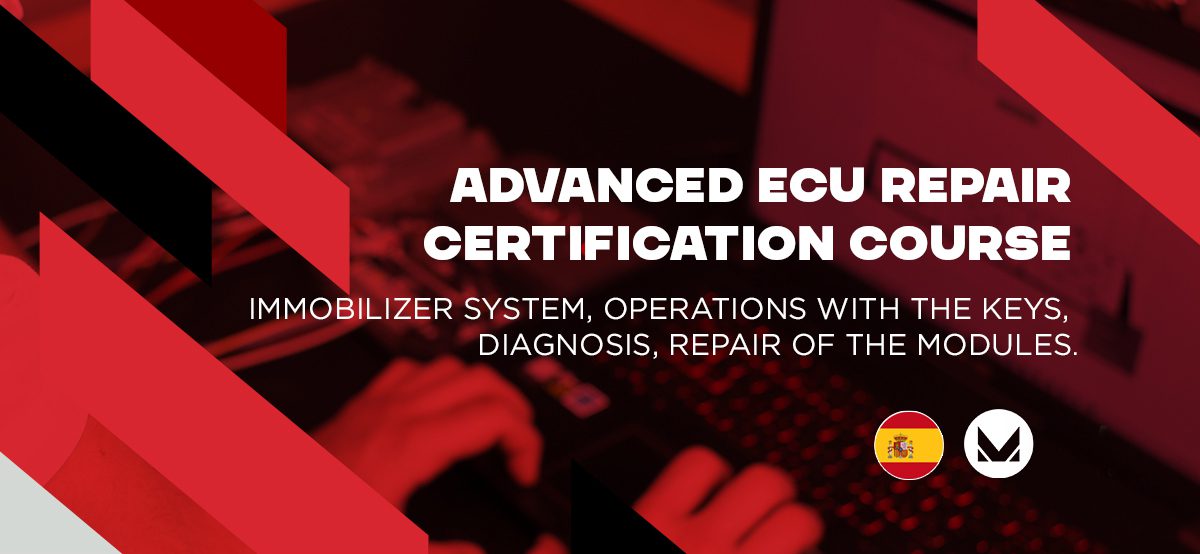
Advanced ECU repair course, Malaga – Spain
Certified Professional Training, in Spain a New Path for Mechatronics
Magic Iberica S.L. has partnered with C.O.P. Centro Optimización – Precisión S.L to offer its customers and all interested parties, certified training courses to attain a mechatronics qualification.
Advanced repair course
The Automotive sector is always evolving, and implementing electronic systems that limit repair in workshops and automotive electronics laboratories. Recent advances in this field require a total update in procedures, techniques and methods used by an effective professional in mechanics and electronics.
Aims
The main objective of this course is to teach students a wide selection of techniques applied to different electronic modules of vehicle and thus to provide solutions for workshops. Save time in diagnoses and inexpensive repairs.
Requirements
Basic knowledge of mechanics and electronics.
Professional Outlets
Training with this technical course allows you to have professional opportunities such as:
- Automotive electronics laboratory technician
- Advanced vehicle diagnostics
- General garage for vehicles
Certificate at the end of the course
Ecu repair technician diploma 2
Course program:
Module 1. Immobilizer system.
- 1.1 How does the immobilizer work?
- 1.2 Identification of immobilizer by unit brands and vehicles.
- 1.3 Description and identification of the memories containing the file immobilizer.
- 1.4 What is IMMO OFF and how is it done?
- 1.5 IMMO Off procedure with programs.
- 1.6 IMMO Off procedure with emulators.
- 1.7 How are memory readers / programmers used?
- 1.8 Work protocols.
- 1.9 Use of software.
Module 2. Identification, generation and duplication of keys.
- 2.2 What is the transponder?
- 2.3 Identification of the transponder according to structure and coding.
- 2.4 Fixed code transponder.
- 2.5 Transponder with encrypted code.
- 2.6 Rolling Code Transponder.
- 2.7 Transponder cloning procedure.
- 2.8 What is the PIN code?
- 2.9 Procedures for reading and changing the PIN code.
- 2.10 Procedures for generating the total loss transponder.
- 2.11 Cloning machines and transponder generators.
- 2.12 Repair of remote controls and keys.
- 2.13 Description of the main electronic components that make up a remote control.
- 2.14 Radio frequency systems.
- 2.15 Infrared systems.
- 2.16 Smart key systems or hands-free keys.
- 2.17 The remote control does not open / close.
- 2.18 The key opens / closes, but does not start.
- 2.19 Work protocols.
Module 3. Reset Airbag Modules.
- 3.1 Identification and diagnosis of the CRASH.
- 3.2 Description and identification of the memories where the CRASH file is located.
- 3.3 Work protocols.
- 3.4 Read, repair files and write directly to memory.
- 3.5 Read, repair the file and write via Pin-Out.
- 3.6Verification of work done.
- 3.7 Use and management of the software.
- 3.8 Use and management of machinery and tools.
Module 4: Repair and adaptation of the instrument cluster.
- 4.1 Identification and diagnosis of the most common faults.
- 4.2 Repair of the most common faults.
- 4.3Adjustment of 1.3 Km in case of replacement due to breakage or loss data.
- 4.4 Description and identification of the memories where to find the KMs.
- 4.5 Special attention
- 4.6 Repair of instrument cluster for Renault, VAG Group, PSA Group, etc …
- 4.7 Repair and replacement of displays.
- 4.8 Work protocols.
- 4.9 Use and management of the software.
Module 5. Repair and cloning of hybrid drives.
- 5.1 Identification and diagnosis of ECU Delphi DELCO, Siemens SIMTEC (GM Group).
- 5.2 Repair of faults in hybrid ECUs.
- 5.3 Use and management of repair techniques.
- 5.4 Cloning / adaptation of hybrid ECUs.
- 5.5 Use and management of the software.
Module 6. Diagnosis and repair of comfort modules, external modules and hybrid injection pumps.
- 6.1 Communication error.
- 6.2 Failures of the comfort modules (BSI, UCH, etc.).
- 6.3 Windshield wiper failure.
- 6.4 Central locking error.
- 6.5 Compressor broken.
- 6.6 Light fault.
- 6.7 Flashing lights failure.
- 6.8 Emergency lights failure.
- 6.9 Electric window failure.
- 6.10 Repair START ERROR (Mercedes-Benz).
- 6.11 Repair of EZS starter motor fault (Mercedes-Benz).
- 6.12 Cloning the EZS module (Mercedes-Benz).
- 6.13 Repair of address block errors.
- 6.14 Cloning the address block module.
- 6.15 Electronic repair and adaptation of hybrid injection pumps.
- 6.16 Description and identification of the different pumps.
- 6.17 Repair and electronic adaptation of OPEL VP44 (PSG16) pumps
- 6.18 Electronic repair and adaptation of FORD VP30 pumps (PSG5)
Module 7. Practical Course
Study methodology
Theory blends with practice for optimal results, with small groups of up to 10 people. By practicing with real units.
Duration and Hours
The course lasts 24 hours, divided between Friday, Saturday and Sunday.
Lesson hours are from 09:00 to 14:00 and from 15:00 to 18:00
We help you
Once the course is over, we do not leave the student alone on this new career path. We offer a technical assistance to help solve any problems.
Price
The total price of the course is € 1260.00 + VAT
The price includes accommodation in hotel, located 400m from the course venue and lunch for the duration of the course.

 English
English  Italiano
Italiano  Deutsch
Deutsch  Español
Español  polski
polski  简体中文
简体中文 